|
|
|
Sort Order |
|
|
|
Items / Page
|
|
|
|
|
|
|
| Srl | Item |
| 1 |
ID:
187584
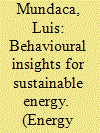

|
|
|
|
|
| Summary/Abstract |
Behavioural insights are increasingly shaping the design, implementation and evaluation of energy policies. This Special Issue aims to broaden and strengthen the evidence base, and policy value of behavioural insights in the context of sustainable energy use. It showcases a plethora of behavioural issues that can help to improve our understanding of the decision-making ‘black box’ of energy users and the contexts in which behaviours take place. Our editorial focuses on five cross-cutting themes, namely: interdisciplinarity, policy experimentation, non-economic factors, the diffusion of low-carbon innovations, and digitalisation. Findings across these themes reveal various challenges (e.g. timescales of energy behaviours, scaling of policy experiments, heterogeneous treatment effects) and four overarching areas are identified when policy implications are examined horizontally: ambition, integration, cooperation and ethics. We conclude that the application of behavioural insights to sustainable energy use provides a rich body of evidence and approaches to support our understanding of complex policy issues. It is an interdisciplinary and resource-intensive process that can effectively assist policymaking by encouraging behaviour change via more integrated, (cost-) effective interventions. Knowledge exchange between social scientists and policymakers is crucial for behavioural insights to realise their full potential. Ethical considerations call for good research practices and improved governance.
|
|
|
|
|
|
|
|
|
|
|
|
|
|
|
|
| 2 |
ID:
116818
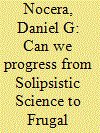

|
|
|
|
|
| Publication |
2012.
|
| Summary/Abstract |
Energy demand in the twenty-first century will be driven by the needs of three billion people in the emerging world and three billion new inhabitants to our planet. To provide them with a renewable and sustainable energy supply is perhaps the greatest challenge for science in the twenty-first century. The science practiced to meet the energy needs of the twentieth century responded to a society of wealth, and energy systems were designed to be large and centralized. However, the inability of the emerging world to incur large capital costs suggests that a new science must be undertaken, one that does not rely on economy of scale but rather sets as its target highly manufacturable and distributed energy systems that are affordable to the poor. Only in this way can science provide global society with its most direct solution for a sustainable and carbon-neutral energy future.
|
|
|
|
|
|
|
|
|
|
|
|
|
|
|
|
| 3 |
ID:
101429
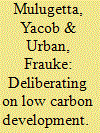

|
|
|
|
|
| Publication |
2010.
|
| Summary/Abstract |
Low carbon development (LCD) is a much used word in development circles today. As such, governments are actively exploring how to achieve their growth targets through a low carbon trajectory or even through a 'carbon neutral' pathway. This is a new area that challenges how development has been done so far, calling for not only a serious rethink of old practices but also contesting entrenched value systems. In this viewpoint, we explore some of the underlying issues that are driving the process of mainstreaming climate change in development. Recognising that there are variations in LCD, we map out the diversity of understandings and interpretations with a view to lay out the range of possibilities that countries can consider. We argue that whilst countries should certainly draw lessons from the experiences of others on mainstreaming climate change in their policies and practices, the version of LCD that each country follows needs to emerge from within its own national reality, anchored in its development prospects, aspirations and capacities.
|
|
|
|
|
|
|
|
|
|
|
|
|
|
|
|
| 4 |
ID:
098642
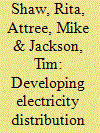

|
|
|
|
|
| Publication |
2010.
|
| Summary/Abstract |
A more sustainable energy system will alter the current patterns of electricity demand and generation. This means technical, commercial and regulatory change for electricity network systems such as distribution networks. This paper traces the links in Great Britain between changes in energy policy since privatisation, changes in the objectives of the electricity regulator and changes in the objectives of the distribution networks and their owners, the distribution network operators (DNOs). The paper identifies tensions in regulatory policy and suggests reforms to the regulatory framework to support a lower-carbon future.
DNOs are licensed regional infrastructure providers. In addition to their network services, the network companies can potentially deliver public policy objectives to facilitate heat infrastructure, energy-efficiency and distributed renewables. The paper identifies the potential benefits of a novel approach to facilitating renewable energy feed-in tariffs for electricity and heat, using DNOs.
|
|
|
|
|
|
|
|
|
|
|
|
|
|
|
|
| 5 |
ID:
132651


|
|
|
|
|
| Publication |
2014.
|
| Summary/Abstract |
This paper uses Q methodology to reveal stakeholder perceptions on how best to address energy issues in Africa. We sampled a group of stakeholders involved in various energy sub-sectors to uncover perspectives on how to achieve and promote access to modern energy, energy efficiency and renewable energy in Africa, whether the perceptions could be correlated to educational or geographical background and implications such patterns could have on policies and current dialogues.
We found that all stakeholders agree on the need to prioritise sustainability but had different views on how to achieve sustainable energy for all in Africa, depending on the relevance given to each energy driver. Stakeholders could be categorised into four groups: (I) preference of large-scale high-impact projects; (II) supporters of targeted sectoral solutions with preference for small-scale technology and microfinance; (III) supporters of centralised solutions with preference for grid extension, and (IV) supporters of local entrepreneurship with scepticism about centralised solutions. The results show that differences in stakeholders' perceptions can be associated with respondents' educational but not geographical background. This implies that dialogues on energy in Africa should focus on inter-disciplinary understanding while further examining the trans-continent consensus that appears to have been established.
|
|
|
|
|
|
|
|
|
|
|
|
|
|
|
|
| 6 |
ID:
138400
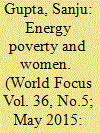

|
|
|
|
|
| Summary/Abstract |
Access to clean, affordable, sustainable energy is thus an enabling factor for economic development and poverty reduction as well as for achievement of internationally agreed development goals, including ensuring environmental sustainability and promoting gender equality. At the same time, access to energy services can be argued to be a human right in itself.
|
|
|
|
|
|
|
|
|
|
|
|
|
|
|
|
| 7 |
ID:
135489


|
|
|
|
|
| Summary/Abstract |
In the other words we can say that geothermal sites in India have a great potential to produce electricity and which can supplement her current and prospective energy crisis. It can contribute great potential and huge environmental benefits India must seriously put efforts on harnessing her least explored alternative source of energy. Therefore geothermal power can become a valuable source of energy if it will properly harness in our country.
|
|
|
|
|
|
|
|
|
|
|
|
|
|
|
|
| 8 |
ID:
109658
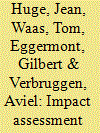

|
|
|
|
|
| Publication |
2011.
|
| Summary/Abstract |
As energy issues are at the top of the policy agenda worldwide, policy-makers increasingly need better decision-supporting processes to assist them in fostering a sustainable energy future. This paper reflects on the interpretation of sustainable development, and links these reflections with the theory and practice of impact assessment applied on energy issues. An analysis of existing impact assessment approaches with regard to their contribution to sustainable development leads to a set of principles for 'sustainability assessment'. Through a study of a participatory impact assessment supporting the development of a radioactive waste management plan in Belgium, the interpretational limits of sustainable development in a nuclear energy context are discussed. This paper sheds light on the complex context in which impact assessment exercises must contribute to sustainable energy development, with a focus on the nuclear energy-(un)sustainability nexus.
|
|
|
|
|
|
|
|
|
|
|
|
|
|
|
|
| 9 |
ID:
181782


|
|
|
|
|
| Summary/Abstract |
Energy Community Initiatives (ECIs) present important beacons in moving to a more sustainable energy provision at household level. The success of ECIs, however, depends on how they are framed as socially acceptable in and around the locations where they are active. Using framing analysis, this paper examines the framing of three urban and seven rural Dutch ECI cases in the period 1989–2017. Key questions are: how have Dutch ECIs been framed in the regional and national press through time, concerning their (positive) contribution to the energy transition and their support, versus (negative) perceptions of ineffectiveness and resistance? Second, to what extent does framing manifest spatial (urban versus rural) and scalar (regional versus national) patterns and divides? The data consists of 527 newspaper expressions focusing on six themes (economic, environmental, social, political, local-development, innovation). Results show that ECIs generally meet a positive framing, emphasizing economic, environmental and community benefits. However, this positivity is primarily related to the instrumental need for ECIs to prove community acceptance rather than exposing ECIs’ strategic roles in promoting the energy transition. Only in urban centres we find relatively more attention for ECIs’ transformational role. We suggest that the energy transition still stands to benefit from a stronger advocacy of ECIs’ contribution notably through a better strategic and spatial framing. This may serve to overcome continuing resistance in more rural locations.
|
|
|
|
|
|
|
|
|
|
|
|
|
|
|
|
| 10 |
ID:
149956


|
|
|
|
|
| Summary/Abstract |
The paper gives an overview of fusion research in the world. The prospects for fusion as an energy source for the future are reviewed. Environmental compatibility, safety and resources are discussed.
|
|
|
|
|
|
|
|
|
|
|
|
|
|
|
|
| 11 |
ID:
176719
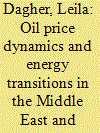

|
|
|
| 12 |
ID:
103369
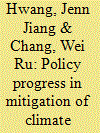

|
|
|
|
|
| Publication |
2011.
|
| Summary/Abstract |
To make an active contribution to the global effort in mitigation of climate change, Taiwan government has implemented the "Frameworks for Sustainable Energy Policy-An Energy-Saving and Carbon-Reduction Action Plan" in June 2008. It has made a commitment of a stepwise reduction of nationwide greenhouse gas (GHG) emissions, which returns the nationwide GHG emission to 2008 levels by 2020, then reduces to 2000 levels by 2025, and finally cuts 50% of 2000 levels by 2050. The fundamental strategy is to reduce the GHG emission under acceptable economic development and energy security to achieve generation-spanning triple-win in energy, environment and economy. The major policy instruments such as "Statute for Renewable Energy Development", "GHG Reduction Law (draft)," "Regulation for Energy Tax (draft)," and "Energy Management Act" have been either implemented or scheduled for legislative reviewing. The purpose of this paper is to present an updated review of the outcomes of GHG emission reduction in Taiwan. In addition, the progress and priority of policy instruments in GHG emission reduction are analyzed as well.
|
|
|
|
|
|
|
|
|
|
|
|
|
|
|
|
| 13 |
ID:
116753


|
|
|
|
|
| Publication |
2012.
|
| Summary/Abstract |
Lithuania has developed several important climate change mitigation policy documents however there are no attempts in Lithuania to develop local climate change mitigation policies or to decentralize climate change mitigation policy. Seeking to achieve harmonization and decentralization of climate change mitigation and energy policies in Lithuania the framework for local climate change mitigation strategy need to be developed taking into account requirements, targets and measures set in national climate change mitigation and energy policy documents.
The paper will describe how national climate change mitigation and energy policies can be implemented via local energy and climate change mitigation plans.
The aim of the paper is to analyze the climate change mitigation policy and its relationship with policies promoting sustainable energy development in Lithuania and to present a framework for local approaches to climate change mitigation in Lithuania, in the context of the existing national and supra-national energy, climate change, and rural development policies.
|
|
|
|
|
|
|
|
|
|
|
|
|
|
|
|
| 14 |
ID:
096073


|
|
|
| 15 |
ID:
180177
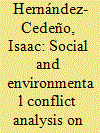

|
|
|
|
|
| Summary/Abstract |
This paper analyzes the social and environmental aspects of energy and large-scale projects through the use of Bayesian Networks. To do this, a database was created that includes conflict causes related to 267 projects in Mexico with 12 well-defined and orthogonal social and environmental conflict causes. These are lack of information and participation, fear of change to local communities, health and environmental damage, reduction of primary sector activities, proximity to cultural landmarks, employee dissatisfaction, political interests, violence to the community, water use, non-compliance of agreements, land use disputes, and others not defined. The database was the input for two Bayesian Networks, network “A” estimates the likelihood of approval or risk of suspension of a project because of the conflict causes, with an overall accuracy of 80.3%. The network “B” estimates the costs of conflictive situations and how likely they can be resolved by adding benefits. A sensitivity analysis found that five conflict causes can reduce the probability of a project's success by 10–39%. Finally, policy implications were identified, resulting in four recommendations for implementation in national regulations. The tools developed here enable measurement of the benefits of energy projects, provide policymakers tools to improve public decisions, and help avoid conflicts.
|
|
|
|
|
|
|
|
|
|
|
|
|
|
|
|
| 16 |
ID:
107523


|
|
|
|
|
| Publication |
2011.
|
| Summary/Abstract |
This paper discusses Egypt's recent energy sector and policy developments against objectives and issues of the energy policy strategy adopted in 2007. It reviews energy supply and demand, pricing and subsidies as well as institutional arrangements and respective reform projects from the perspective of assessing achievements. It identifies the consequences of the policy and the long-term outlook and reports on the internal policy struggle.
The policy strategy of 2007 is directed at energy security, social and industrial development. Environmental or climate objectives play no role. Energy efficiency is at best considered an instrument. The implementation of the strategy has been successful on the supply side, but not on the demand side. Price reform, refocusing subsidies and sector reform were not achieved. This has negatively affected energy efficiency and diversification, energy availability and supply security, the State budget and the sector's financial capacity. It causes rising energy import requirements and increasing risks to the current account balance. In spite of that, "old guard" and industrial establishment favour the resource-based development based on cheap energy and protract price reform, whereas another group of businessmen wants a sustainable development concept and monetize the oil and gas production to invest in Egypt's competitiveness.
|
|
|
|
|
|
|
|
|
|
|
|
|
|
|
|
| 17 |
ID:
115660


|
|
|
|
|
| Publication |
2012.
|
| Summary/Abstract |
Most scientists agree that climate change is affected by anthropogenic factors, and measures to reduce carbon dioxide emissions are being considered among countries. The maritime transportation sector must bear its share of responsibility for adopting corrective innovative measures on a global scale. The authors projected the energy consumption and emissions of different marine transportation types in 2050 and applied the model of stabilization wedges to explore activities and technologies to deduce policies that would lead to sustainable marine propulsion. Three percent of the global emissions reductions -about 44 GtCO2/y- required to stabilize the temperature under 2 °C above current levels must come from the maritime sector. To meet a reduction target of this segment, about 1.67 GtCO2/y in 2050, we propose a range of technologies that include mission refinement, resistance reduction, prime mover and propulsion innovation, and new fuels. The authors find that the goal is partially attainable and proposes the balance to be delivered by dedicated land-based synfuel refineries that use carbon dioxide from coal power plants and hydrogen produced from sustainable sources, an approach that would extend the lifecycle of conventional prime movers. We await the adoption of suitable technologies to reduce the emissions in the maritime sector.
|
|
|
|
|
|
|
|
|
|
|
|
|
|
|
|
| 18 |
ID:
142008
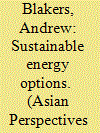

|
|
|
|
|
| Summary/Abstract |
Solar energy is special: It is vast, ubiquitous, and indefinitely sustainable. The solar resource is much larger than all other available energy resources combined. Solar energy utilizes very common materials; has minimal security and military risks; is available nearly everywhere in vast quantities; and has minimal environmental impact over unlimited time scales. The recent (and continuing) rapid price reduction in photovoltaics and wind energy was not generally foreseen, and is likely to lead to widespread market disruption. New wind and solar photovoltaic (PV) systems are both being deployed around the world in similar scale to new coal, gas, and hydro systems. Renewable energy now constitutes the majority of new generation capacity installed each year. Electricity from wind and PV systems is now cost-competitive with newly built coal, gas, oil, and nuclear generators in many parts of the world. Roof-mounted PV systems successfully compete with conventional gas and electricity for the supply of heat and electricity in cities. Transport and chemical synthesis powered by PV and wind electricity is likely to be competitive in the future.
|
|
|
|
|
|
|
|
|
|
|
|
|
|
|
|
| 19 |
ID:
125606


|
|
|
|
|
| Publication |
2013.
|
| Summary/Abstract |
Community energy has been proposed as a new policy tool to help achieve the transition to a low-carbon energy system, but the evidence base for this strategy is partial and fragmented. We therefore present new empirical evidence from the first independent UK-wide survey of community energy projects. Our survey investigates the objectives, origins and development of these groups across the UK, their activities and their networking activities as a sector. We also examine the strengths and weaknesses of these groups, along with the opportunities and threats presented by wider socioeconomic and political contexts, in order to improve understanding of the sector's potential and the challenges it faces. We highlight several key issues concerning the further development of the sector. First, this highly diverse sector is not reducible to a single entity; its multiple objectives need joined-up thinking among government departments. Second, its civil society basis is fundamental to its success at engaging local communities, and makes the sector quite distinct from the large energy companies these community groups are aiming to work alongside. There are inherent tensions and vulnerabilities in such a model, and limits to how much these groups can achieve on their own: consistent policy support is essential.
|
|
|
|
|
|
|
|
|
|
|
|
|
|
|
|
| 20 |
ID:
088053
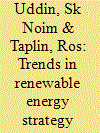

|
|
|
|
|
| Publication |
2009.
|
| Summary/Abstract |
This article analyses and discusses trends in renewable energy strategy development in Bangladesh and the prospective role of the clean development mechanism (CDM) under the Kyoto Protocol. Use of renewables for electricity generation results in less greenhouse gas emissions compared with fossil fuel energy systems and often offers additional synergistic benefits. Despite the large potential for development of renewable energy sources in Bangladesh, currently their contribution to electricity generation remains insignificant. Existing policies and programs on renewable energy in Bangladesh are reviewed in relation to the specific requirements needed for CDM. A number of barriers are identified that impede the implementation of the CDM mechanism. Overall, it is recommended that more appropriate energy strategies, including a new national renewable energy strategy, need to be formulated and implemented and more suitable institutional settings need to be provided to promote energy sustainability for Bangladesh. Also, the suggestion is made that incorporation of objectives for CDM promotion in the new national renewable energy strategy to tie in with Bangladesh's CDM strategy should assist in advancement of renewables.
|
|
|
|
|
|
|
|
|
|
|
|
|
|
|
|
|
|
|
|
|